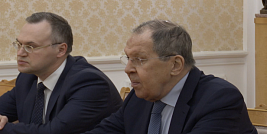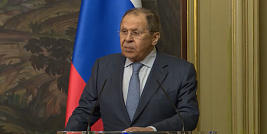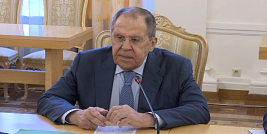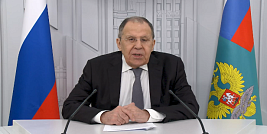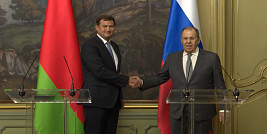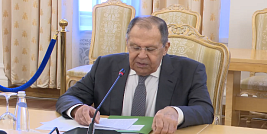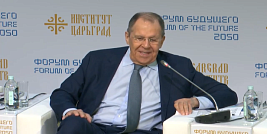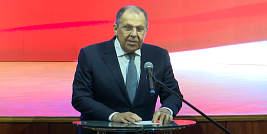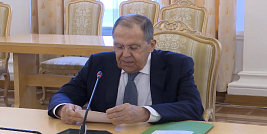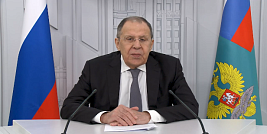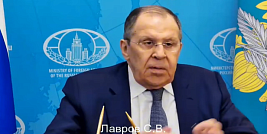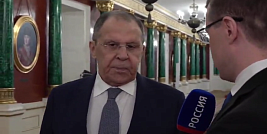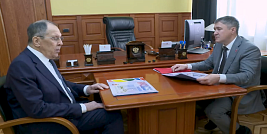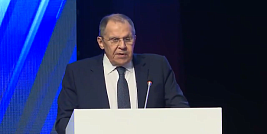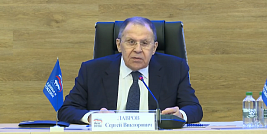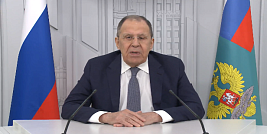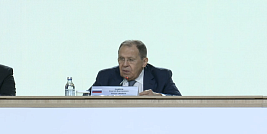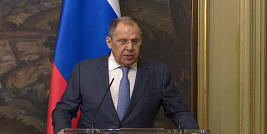Briefing by Foreign Ministry Spokeswoman Maria Zakharova, St Petersburg, June 19, 2025
On events in St. Petersburg within the framework of SPIEF
Let me first welcome you here in Russia, in St Petersburg, on the sidelines of the St Petersburg International Economic Forum, which provides an excellent opportunity for offsite briefings. It has already become a good tradition. I would like to thank the organisers for their constant support.
At the previous briefing, I gave a detailed description of the forum. Now I will be brief. You can see everything yourselves: amazingly interesting presentations and exhibitions, informative and busy agenda, and topical discussion themes. The scope of participation is also impressive: there is no need to repeat the figures, as you are well aware of them. This is evident both in the number of participants and in the diversity of countries represented. Delegations have arrived from the CIS, BRICS, SCO, ASEAN, Africa, the Middle East, and Latin America. The individual representation alone is extraordinary. The business programme includes 150 events.
We are in St Petersburg, a unique city that has many symbolic names and is often referred to as an open-air museum. This city has inspired a vast number of poets, writers, artists, architects, composers, and other creative people. And not just them – many scientists have earned international acclaim here, and numerous achievements of universal importance have been made, including those promoting humanistic ideals.
In the year that marks the 80th anniversary of Victory, I would like to mention the heroism of Leningrad, as it was known during the Great Patriotic War. The city withstood a brutal siege, now officially recognised as an act of genocide. It lasted 872 days and took the lives of over a million people. This figure, tragically, is not final, as researchers continue to uncover new data, which is published and openly accessible. In 1965, the city was awarded the honorary title of Hero City. The defence of Leningrad became a global symbol of endurance, courage, and the triumph of good over evil. The Leningraders’ bravery is etched not only in the memory of our nation but in the hearts of people around the world.
I would like to invite you to a session at 17:00, immediately after the briefing with a short break, which will feature a truly exceptional guest – Irina Bulina, a survivor of the Leningrad siege. This is a unique chance to see her and talk to her. At the session, her reissued book dedicated to her memory and the memory of her family, containing her diaries and notes, will be presented. This edition was made possible through the support of the Foreign Ministry and generous sponsors.
I urge you to attend and listen to the history of this city and the country from someone who lived through it.
International and interregional relations of St Petersburg and Leningrad Region
We note the consistent efforts undertaken by the leadership of St Petersburg and the Leningrad Region to expand diverse interregional and foreign economic ties with friendly countries amid current geopolitical realities. Based on the outcomes of the St Petersburg International Economic Forum, the city is expected to reach a record high number of agreements with investors aimed at strengthening Russia’s technological sovereignty.
Efforts are being made to boost the foreign trade of St Petersburg and the Leningrad Region, to stabilise the trade balance compared to the 2022-2023 levels, and to further diversify the foreign trade structure.
China remains the main trading partner. Trade with Kazakhstan is expanding. Against the backdrop of stronger economic cooperation among the CIS countries, expanding trade ties with Belarus holds significant promise. Cooperation with Iran and Türkiye is expanding as well. The above countries account for 77.4 percent of overall trade, with China accounting for 43.2 percent in exports and 43.1 percent in imports. Major deals have been signed with Myanmar, the Republic of Korea, Brazil, Germany, and Egypt. Ties with Serbia in healthcare, education, the manufacturing industry, high technology, tourism, and urban infrastructure have expanded.
The volume of St Petersburg trade increased by 9 percent to $56.7 billion in 2024 compared to 2023. Export value rose by 8.6 percent to $29 billion. Imports continued to grow to $27 billion, a 9.4 percent increase.
The Leningrad Region is expanding cooperation with its partners in Azerbaijan, Kazakhstan, Kyrgyzstan, and South Ossetia. Agreements will be signed with the Republic of Abkhazia, as well as with regions of Uzbekistan, Tajikistan, Syria, and the Republic of South Africa. The region’s foreign trade in 2024 saw a deceleration in decline to 5.1 percent, totaling $10.7 billion. Its major trading partners include China, Türkiye, Belarus, Kazakhstan, Brazil, India, and Vietnam. Aggregate trade with these countries accounts for 75.6 percent of the total. The Leningrad Region also holds a leading position in terms of trade growth with Belarus. Joint projects are underway in construction and the production of agricultural and public utility machinery.
Overall, the Leningrad Region and St Petersburg lead the way in building up the legal and regulatory framework for interregional cooperation. More agreements are being concluded with the countries that are friendly or constructively-minded with regard to Russia. Relevant roadmaps for implementing them are being drafted.
In addition, St Petersburg and the Leningrad Region maintain close contacts with our compatriots residing in the Baltic states who are facing persecution from Russophobic regimes for refusing to adopt an anti-Russia stance. What I’m saying is these people are unwilling to forgo things that they hold dear and things that underlie their philosophy and their way of life. They endure suffering over this.
Events related to celebrating the 80th anniversary of the Great Victory and military memorial activities had a special place on the Russian regions’ business calendar. Delegations from Abkhazia, Armenia, Belarus, Kazakhstan, Kyrgyzstan, Turkmenistan, and Uzbekistan came to St Petersburg to participate in the festivities. Siege survivors and veterans living abroad have also made a valuable contribution to preserving the sacred memory of the victorious generation. They participated in the Victory Parade, the Immortal Regiment march, and festive concerts and processions. I believe you followed these events as well.
Foreign Minister Sergey Lavrov’s upcoming participation in the 11th Primakov Readings International Expert Forum
On June 23, Sergey Lavrov will participate in the 11th annual Primakov Readings International Expert Forum. The event is organised by the Yevgeny Primakov National Research Institute of World Economy and International Relations of the Russian Academy of Sciences.
For many years, this forum has convened prominent politicians, economists, scholars of international relations, and public figures from across the globe in Moscow. This has cemented its distinctive position among comparable events. It bears recalling that as early as the 1990s, Yevgeny Primakov foresaw multipolarity emerging as a defining trend in global development. At the time, this was nothing less than a revolutionary proposition, one he advanced resolutely during his tenure as Russia’s Foreign Minister from 1996 to 1998. The current international landscape has fully validated Yevgeny Primakov’s political acumen.
In his remarks at the forum, Foreign Minister Sergey Lavrov will evaluate contemporary international developments and articulate the priorities of Russia’s foreign policy. A discussion will obviously ensue, during which the Minister will also field questions.
Sergey Lavrov’s visit to Turkmenistan
On June 24–25, Sergey Lavrov will undertake an official visit to Turkmenistan. During the visit, he will hold talks with President of Turkmenistan Serdar Berdimuhamedov and Deputy Chairman of the Cabinet of Ministers and Minister of Foreign Affairs of Turkmenistan Rashid Meredov.
The parties will deliberate on forthcoming highest and high level political engagements, the advancement of bilateral relations – including cooperation in trade, economic, cultural, and humanitarian spheres – and will exchange perspectives on regional dynamics, the global situation, and mutual collaboration between our two countries within multilateral frameworks.
Visit to Russia by Minister of Foreign Affairs of the Lao People’s Democratic Republic Saleumxay Kommasith
On June 24–29, Minister of Foreign Affairs of the Lao People’s Democratic Republic Saleumxay Kommasith will make an official visit to Russia. Talks and meetings will be held in Moscow, with a scheduled meeting with Foreign Minister Sergey Lavrov on June 26.
The parties will review the current state and future trajectory of bilateral partnership in the Asia-Pacific region, emphasising the implementation of agreements reached during highest level talks in 2024 – notably those conducted in Moscow on May 9 and in Kazan on October 24, 2024. They will conduct a thorough examination of avenues to strengthen political dialogue, trade and economic collaboration, and cooperation in defence and security, alongside an assessment of existing cultural ties. Special focus will be accorded to intensifying coordination on international and regional matters.
Iran-Israel escalation
Regrettably, the most perilous escalation of tensions in the Middle East continues, instigated by Israel’s unprovoked aggression against Iran – a sovereign member of the United Nations – in violation of the UN Charter and international law. You are, of course, familiar with the two statements issued by the Russian Foreign Ministry (1, 2), which resolutely condemn this criminal venture, fraught with catastrophic consequences for both regional and global security.
Attempts to justify these actions by invoking fictitious non-proliferation concerns are a flagrant display of cynicism.
Allow me to remind you that as of June 13 – a date that, in itself, substantiates the aforementioned argument – when the first strikes were launched against Iranian territory, intensive yet challenging negotiations were underway in the form of indirect Iran-US contacts facilitated by Oman. A further round of substantive dialogue had been scheduled for June 15, for which Tehran had prepared a series of proposals aimed at advancing a desired resolution. Concurrently, a session of the IAEA Board of Governors was in progress, addressing matters related to the Iranian nuclear deal.
Israel’s actions have undermined and set back painstaking multilateral efforts to de-escalate confrontation and forge reliable solutions that dispel unfounded suspicions and prejudices regarding Iran’s peaceful nuclear energy. Was this not precisely the objective pursued by Western Jerusalem, deliberately opting for heightened tensions and the sabotage of peace initiatives? This is a question many are now asking.
Equally staggering is the hypocrisy of certain West European leaders. Having zealously stoked anti-Iran hysteria ahead of the IAEA Board of Governors meeting, they effectively incited Israel to aggression. And now, astonishingly and perversely, they demand that Iran “return to the negotiating table.”
We are gravely concerned by the ongoing military hostilities, which have resulted in numerous civilian casualties. We categorically condemn Israel’s attacks on peaceful nuclear facilities in the Islamic Republic of Iran. Such actions are unlawful under international law, pose unacceptable threats to global security, and push the world to a nuclear catastrophe – the consequences of which (God forbid) would reverberate worldwide, including within Israel itself. Russia urges Israeli leadership to immediately cease its raids on nuclear installations and sites that are under IAEA safeguards and are subject to IAEA verification. Particular alarm surrounds the safety of the Bushehr Nuclear Power Plant, where Russian specialists are engaged.
The firm and unequivocal response of the Global Majority to Israel’s strikes on Iranian territory – including its nuclear energy infrastructure – coupled with the outcomes of the UN Security Council’s emergency session on June 13 and the IAEA Board of Governors’ special session on June 16, demonstrates widespread rejection of Israel’s confrontational and destructive course. This approach finds sympathy and support solely among states complicit in its actions.
The immediate priority now is to halt the spiral of violence, secure a ceasefire, and restore peace – thereby creating conditions for a return to negotiations. We stand ready to contribute fully to this effort and are actively pursuing political and diplomatic measures to that end.
As is well-known, on the very first day of the conflict’s hot phase, President of the Russian Federation Vladimir Putin held telephone conversations with Israeli Prime Minister Benjamin Netanyahu and President of the Islamic Republic of Iran Masoud Pezeshkian. The following day, as you are aware, Vladimir Putin spoke with US President Donald Trump. Subsequent contacts were made with President of Türkiye Recep Tayyip Erdoğan and President of the UAE Mohamed bin Zayed Al Nahyan. Foreign Minister Sergey Lavrov conducted telephone discussions with his counterparts – Iranian Foreign Minister Abbas Araghchi, Turkish Foreign Minister Hakan Fidan, Egyptian Foreign Minister Badr Abdelatty, and Omani Foreign Minister Badr bin Hamad Al Busaidi. The current Middle East crisis was also addressed during the Russian Foreign Minister’s telephone conversation with Azerbaijani Foreign Minister Jeyhun Bayramov and with Indonesian Foreign Minister Sugiono.
As you are aware, highest level negotiations, foreign ministers engagements, and telephone contacts continue even at this hour.
We remain hopeful that recognition of the imperative to seek mutually acceptable negotiated solutions to the present challenges will prevail. Russia will persist in supporting efforts to resolve issues surrounding Iran’s nuclear programme, grounded firmly in international law, the principle of equal and indivisible security, and a balanced consideration of mutual interests. We want particularly caution Washington against military intervention, which would constitute an exceedingly dangerous step with truly unpredictable repercussions.
Russia acknowledges Iran’s clear statements reaffirming its unwavering commitment to obligations under the Treaty on the Non-Proliferation of Nuclear Weapons (NPT) and its readiness to resume contacts with the United States to explore potential solutions that would dispel any unfounded suspicions and prejudices regarding Tehran’s nuclear programme – provided Israeli attacks cease. Moscow supports this stance and firmly maintains that a sustainable resolution can only be reliably achieved through diplomacy and negotiations. The objectives of nuclear non-proliferation, the cornerstone of which remains the NPT, must not be pursued through aggression or at the cost of innocent lives.
Evacuation of Russian citizens from Iran-Israel conflict zone
In light of the dramatic escalation between Iran and Israel, exchange of strikes and closure of the air space, the Foreign Ministry and the Russian embassies in Iran, Israel, Iraq, Kuwait, Türkiye and other countries have been working to organise the speedy evacuation of Russian delegations, the staff of Russian agencies, organisations and economic operators working temporarily in the said countries, as well as the families of the staff of Russian offices abroad.
Since June 14, 2025, about 550 people have moved out of Iran to Azerbaijan and Armenia for departure from Baku and Yerevan, including the film crew of Fyodor Bondarchuk, the Tchaikovsky Orchestra, members of the Gorchakov Fund, oilfield workers, travel groups, and Russian citizens. Over 120 people have moved out of Israel, including music groups, pilgrims and tourists, for departure from the airports of Egypt and Jordan. Support has also been provided to the citizens of Belarus, Serbia, Uzbekistan and Tajikistan.
As per the recommendation of the Economic Development Ministry, travel agents have halted the sale of vouchers to Iran and Israel, where no more than a dozen members of package tours are left.
The available exit routes from Iran are via the Astara checkpoint on the border with Azerbaijan and the Agarak checkpoint on the border with Armenia (the choice should take into account current location, travel risks, logistics, travel time to the nearest international airport and other factors). We have published and will continue to publish our practical recommendations and notifications on the Telegram channels of the Foreign Ministry and Russian embassies in Tehran and Yerevan. The links will be provided in the print version of this briefing.
Three are also three checkpoints for crossing into Türkiye, which work round the clock – Gurbulak-Bazargan, Kapıköy-Raziye and Esendere-Sero.
Exit from Israel to Egypt is open through the Menachem Begin-Taba checkpoint round the clock, and there are three border crossings into Jordan – the Jordan River/Sheikh Hussein Crossing (open from 9 am to 4 pm), the King Hussein Bridge (Allenby) Terminal (8 am to2 pm), and the Yitzhak Rabin Terminal/Wadi Araba Crossing (8 am to 8 pm).
There are 20 direct flights from Baku to Russia every day by Aeroflot, Rossiya, Red Wings, S7, IrAeo and Azerbaijan Airlines, about 20 flights from Yerevan every day by Aeroflot, UTair, Ural Airlines, FlyOne, Armenia, Azimuth, and Shirak Avia, and five Cairo-Moscow flights every week by Aeroflot and Egypt Air.
In light of rapid changes in the situation, we recommend our citizens to monitor the regularly updated messages and notifications on the Foreign Ministry’s internet resources, namely the official Ministry account on Telegram and the Ministry’s website, as well as the resources, sites and Telegram accounts of our embassies in the region, which I have mentioned.
If necessary, call our emergency numbers at the Russian embassies in Iran (+98-21-6670-1161/63,+98-993-814-7226;rusembiran@mid.ru; and t.me/russianembassytehran, Azerbaijan (+994-12-597-0870, +994-50-270-2659, embazerbaijan@mid.ru; and t.me/s/embrusaz), Israel (+972-53-600-3847, +972-54-962-2341; cons.israel@mid.ru; and t.me/RussiaInIsrael), Armenia (+374-94-00-47-95, +374-91-21-71-13; consarmenia@mid.ru; and t.me/rusembassyarm), Egypt (+20-128-009-50-99; rusembegypt@mid.ru; and t.me/rusembeg),and Jordan (+962-7-75-52-81-25, +962-7-77-42-66-18; rusembjo@mid.ru; and t.me/rusembjo).
Three is also a 24/4 hotline of Ministry’s Crisis Management Centre (Department) +7-495-695-4545; dskc@mid.ru; t.me/DSKC_MID, and the Foreign Assistant mobile app.
We would like to express gratitude to the authorities of Iran, Azerbaijan, Armenia and Iraq for their assistance in organising evacuation procedures.
We are also wholeheartedly grateful to our Azerbaijani partners for helping Russians returning home from Iran amid the dramatic escalation in the Middle East, especially in the first days of the crisis, when we had to act at short notice. We are promptly addressing all the organisational and logistics issues with Baku. To date, over 500 Russian citizens have crossed from Iran into Azerbaijan via the Astara checkpoint. They have expressed gratitude for a warm welcome, hospitality, assistance and support they were given in Azerbaijan. As you know, the Tchaikovsky Orchestra gave a charity concert in Baku on June 17 to express its gratitude to the people of Azerbaijan.
It sometimes happens that people can’t find common language and show empathy in an ordinary situation that is not darkened by conflicts, escalations, threats or emergencies. And it also happens that they do so when everything is on fire and people don’t know if they will survive or not and can’t phone their loved ones, let alone leave the dangerous zone. That is exactly what has happened when people, who had to hide in bomb and other shelters, as well as basements, saw the manifestations of true humanism and all the other best features of human society. We have seen this on all sides, including the recipients of assistance. They have expressed sincere personal gratitude and also spoke on behalf of all the others who have been given and will be given help and assistance.
The escalation in the Middle East has led to the closure of the air space in most regional countries and put the crews of Russian passenger aircraft in the air in a challenging situation, to put it mildly. Did those who have created this havoc think about that? For example, on June 13, a Siberia flight from Novosibirsk to Dubai had to change its route and request an emergency landing at Ashgabat International Airport. We are deeply grateful to the Turkmen partners for their prompt reaction in that difficult situation and the assistance they provided to the passengers and crew of the Russian plane.
We once again urge Russian citizens to refrain from traveling to Iran and Israel until the situation normalises and those who are currently in the region to leave the dangerous areas. If the latter is impossible, they should take maximum personal safety measures, namely, avoid military facilities, critical infrastructure sites, refrain from taking photos or videos, avoid crowded areas, follow the instructions of the authorities, and head towards shelters without delay. As I have said, we promptly update relevant information on our resources.
Ukraine update
Russia has come close to completing the humanitarian package contained in the agreements with Ukraine as concluded during the second round of direct talks in Istanbul on June 2, 2025. As you know, Russia repatriated 6,060 bodies of Ukrainian Armed Forces personnel to demonstrate its good will. In return, we received 78 dead bodies of our fighters, while Russia’s Ministry of Defence confirmed that it was ready to hand over another 2,239 bodies of Ukrainian troops to Kiev.
There is an ongoing effort to hold reciprocal exchanges of prisoners who suffer from severe health conditions or are wounded, as well as young soldiers below the age of 25 years – let me remind you that Russia suggested all these initiatives. These exchanges include several stages, and we expect at least 1,000 people to come home on each side. We are working hard on the list of 339 Ukrainian children we have received. Let me remind you that they were not kidnapped in any way or stolen or forcefully displaced or taken out of the country by force, no matter what anyone says. These children cannot get back together with their parents. Some of them have to be located since there is no information about them.
This is a tragic situation. But unfortunate as it is, various countries and cities, even quite prosperous ones, face this tragedy, let alone a territory which has been suffering from the shelling by the Kiev regime for so many years, since 2014.
After June 22, the Russian delegation – I am referring to the delegation of the Russian Federation as approved by President Vladimir Putin – will be ready to travel to Istanbul for continuing the talks. The exact timeframe will be determined soon – we have been receiving a lot of questions on this topic. The representatives and leaders of the delegation will share these details. During the third round of talks, we intend to discuss the memorandums which were submitted on May 28, 2025, and June 2, 2025. They set forth proposals on ways of settling the Ukraine crisis.
You may have noticed that Kiev has been furious, or should I say went crazy, when it saw that Russia was carrying out the Istanbul agreements in good faith. It started making extremely cynical comments. Everyone pitched in, including Ukrainian government officials and journalists, unfortunately. A female presenter for Ukraine’s Kanal 24 tried to persuade her audience that Russia never handed over these 6,000 dead bodies and that this myth came from Moscow. She said that Russia cut these corpses into pieces and split them into different plastic bags in order to pretend that there were more bodies – I have to summon my courage to say this every time, but this is my duty because this is an accurate quote of what this anchor has been saying. Moreover, this Ukrainian journalist claimed that there was a massive effort to dig out the graves of local residents in the territories of the regions which have reunited with Russia. She said that these people died and were buried before the start of the special military operation. She went as far in her sickly insinuations as claim that these were planned initiatives for demonstrating the scale of this issue, inciting protests and achieving regime change.
Does this mean that she ignored the scale of this issue in Ukraine if not for these 6,000 dead bodies? They pretend to keep their people informed about this scale, while blaming Russia. But all of a sudden, they start denying that this is a major issue.
Ukraine’s Interior Minister Klimenko has adopted a similarly outrageous logic by blaming Russia for intentionally making it harder to identify the corpses it hands over to Ukraine. Therefore, they started by refusing to take these bodies, and then argued that we were the ones who made things so complicated. What kind of gibberish and devilish muttering do we keep hearing from them? What did he want to say? Let me remind you that he is Ukraine’s Interior Minister. He claimed that the dead bodies they receive are extremely mutilated and split into several plastic bags. How can a grown-up man and especially someone who heads a law enforcement agency say this about people who died during military action?
But it gets worse. The next statement he made is a nightmare for me. Here it is. Interior Minister of Ukraine Igor Klimenko said that the bodies of Ukrainians and Russians were all mixed up. But when journalists asked him to explain how it was possible, he failed to offer an explanation. I think that he needs to see a doctor. I am serious about it.
Could it get any worse? In can. Vladimir Zelensky went even further. While in Austria on some kind of a business trip, he said on June 16, 2025, that Russia suggested returning Ukrainian children in exchange for Russian troops. We can see him on the screen every now and then in quite a strange state. That said, I do not know what kind of drugs he has been taking to lie this way. This amounts to outright cynical and horrible lies. Once again, they are probably designed to derail the Istanbul process and the mediating efforts by the countries seeking to facilitate it.
But there must be at least some logic in what they do. If they handed over a list with just 339 names on it, why do they try pretending that someone had additional requests and suggested changing something? He should have explained how the figure of 20,000 children shrank to 339 in a matter of months.
Once again, I would like to stress that Russia does not kidnap, deport or forcefully displace children, let alone trade them against prisoners of war or anyone else. Our fighters risk their lives to save children and they do this without asking where these children come from, where they belong, what passport they have or what country issued their birth certificates, what kind of blood runs in their veins, and what is their ethnic background or religion. Saving every child is what matters the most. All we do is take them out of combat zones.
With the mediation of Qatar, Belarus, and several other countries, as well as the International Committee of the Red Cross, Presidential Commissioner for Children’s Rights Maria Lvova-Belova engages in complex efforts to have Ukrainian and Russian children reunite with their respective families. As you may be aware, as of today, 101 Ukrainian children from 81 families have reunited with their relatives in Ukraine and other countries; and 22 children have returned from Ukraine to their 15 families in Russia.
I would also like to note that Ukrainian citizens, whose children are being taken away by the social services in the Western European countries, have repeatedly contacted Russian diplomatic missions in utter state of despair. They reach out to Russia, because Ukrainian embassies flatly refuse to even discuss this issue, citing “political circumstances.”
Let me explain what these “political circumstances” are all about. If the Ukrainian embassies stationed in the EU countries send a diplomatic note or raise the issue of them searching for Ukrainian children within the borders of the EU countries, the myth that all Ukrainian children allegedly disappear because of Russia, in Russia, or with Russia having a hand in it, will be refuted. It will vanish. This is what stands behind “political circumstances.” But in reality, it’s infamy of the highest order. This is how they take care of their own children.
The above could be dismissed as another Russian propaganda stunt, but, in an interview with the national media in April 2024, Ukrainian Commissioner for Human Rights Dmitry Lubinets disclosed statistics showing that 255 children had been taken away from Ukrainian families in European countries. This is their official statistical data. The information released on April 17, 2024 by the Ukrainian National Police deserves special attention. It shows that over 160 Ukrainian children, who Bankovaya Street alleged had been shipped to Russia or by Russia, suddenly turned up in Germany. Everything will come to light. Truth will prevail. And everyone will be horrified by the lies and hypocrisy spread by the people on Bankovaya Street.
Clearly, we are dealing with another staged campaign to discredit Russia. Similar ploys were used to fabricate other cases, such as Bucha with catchy headlines in Western media but no facts or evidence to back it up, just sloganeering.
Throughout its history (not just these days and years, but always), our country has shown humanism in the truest sense of the word. Think of the monument in Treptower Park. It’s not just a Soviet soldier holding a German girl. It’s a historical fact: these soldiers and these children had names.
The terrorist nature of the Kiev regime is widely known, but I will continue to cite facts, figures, and data to corroborate our description of this regime.
They did their utmost to mar festive events on Russia Day, June 12. Bandera terrorists targeted civilians and civilian infrastructure in the Russian regions.
Over the past week, their shelling resulted in 104 casualties, including eight fatalities, among them one minor person; 96 people were injured, including 14 children and teenagers.
On June 9, in the village of Prigorodnyaya Slobodka, Kursk Region, a civilian was killed and five other people were injured.
On June 10, in the village of Sheptukhovka, two combine-harvester operators got thermal burns after hitting a Ukrainian landmine.
Three children aged 7, 9 and 13 were injured in enemy UAV attacks on the village of Maryino. The glazing of two rural health posts was damaged. The bleeding-heart Westerners that provide money and weapons to the Kiev regime and Western NGOs that keep saying they care about children are nowhere to be seen. They don’t care about anything. Cultural centres and health resorts were hit as well. Windows in the local primary school were shattered.
On June 11, in Rylsky District, a Ukrainian drone pursuing a civilian car maimed the driver.
On June 10, in Belgorod, a UAV attack on a petrol station killed one person and wounded five more.
In Shebekino, Belgorod Region, an FPV-drone attack on a local enterprise on June 11 wounded six civilians.
On June 12, in the village of Borisovka, a two-year-old child was killed in a UAV attack by Ukrainian forces; the child’s grandmother was taken to the hospital in grave condition.
In the Bryansk Region, Ukrainian drones attacked the village of Brakhlov on June 11, wounding two people. On June 15, a local resident was injured when a Ukrainian drone hit a civilian car in the village of Podlesnye Novosyolki.
In the DPR, on June 9-15, at least 14 people were wounded, including six teenagers and one Russian Emergencies Ministry employee. On June 12, in Makeyevka, a woman, born in 1957, sustained severe injuries after stepping on a Lepestok antipersonnel mine in a horticultural non-commercial partnership. On June 13, the same population centre was hit by shrapnel rounds from a HIMARS MLRS killing a married couple: a man born in 1977 and a woman born in 1980. On the morning of June 17, Ukrainian Nazis targeted a residential block of flats in Donetsk’s Leninsky District with MZ-1 fragmentation missiles from a HIMARS MLRS, wounding 14 people.
In the LPR, a 17-year-old was injured in a drone attack in the town of Kremennaya on June 14.
In the Kherson Region, on June 11, a resident of Proletarka was wounded during Ukrainian shelling. Wildfires broke out on an area of 43 ha; a 150 kV power line was damaged, leaving 392 population centres and over 250,000 residents without power. On June 12, in the village of Rovnoye, two people, including a 79-year-old woman, were injured in Ukrainian strikes; in Alyoshki, the enemy targeted an ambulance. On June 14, in Novaya Kakhovka, one person was injured by Ukrainian fire.
In Tatarstan, on June 15, Ukrainian drones hit an automobile plant in Yelabuga District injuring 18 people; two more died beneath drone debris that fell onto a car park near a checkpoint. Three children were wounded.
Please note that at 11 am on June 26, the Press Centre of MIA Rossiya Segodnya will host a presentation of a report by the International Public Tribunal, Atrocities and War Crimes Committed by the Kiev Regime in the City of Dzerzhinsk.
Russian and foreign media members are welcome to attend.
To be continued...

